
Original Broadcast Date: June 5, 2019 – July 25, 2019
Written by Kwon Eun-sol, Directed by Jung Ji-hyun, Kwon Young-il
Starring Im Soo-jung, Lee Da-hee, Jeon Hye-jin
“Give me Cha Hyeon,” Ga-kyeong says, and as the scene whips between reaction shots and the music swells, I’m bouncing the iPad on my knees, making a positively indescribable noise. Search: WWW often shocked me like this, inducing so much excitement and even dread, then clocking me square in the stupid grin. It was urgent somehow, to even process my experience with it — but I couldn’t. Perhaps it left me feeling so much that my thoughts were annihilated. I’d like to recommend it, but where do I even start? I looked at the “Recommended Korean Drama” on this site for Cheer Up! from February 20, 2020, and zeroed in on this line: “Cheer Up is a vibrant and unexpectedly moving TV series about finding your self and your society in the face of a dystopic institution.” I can’t believe I thought that would be sufficiently convincing. “Oh, I’d love to see something about finding my self and my society,” the choir roars, and I don’t know. Maybe. What I need now is the how and why behind “moving” especially, as indeed, Search: WWW had me in tears multiple times, and after the final episode I couldn’t move on. Most of the media I consumed subsequently were the soundtrack and clips from the show. Only clips, for reviewing the whole series would be like round two on the roller coaster while pulling up queasy to the station.
My understanding is that the K-drama fan hardly needs a recommendation, because these shows are intimately accessible and even addictive. For the initiated, I’ll be sure to outline what makes Search: WWW unique, and for everyone else, what makes Search: WWW so compelling. This is at the heart of the addiction, then, the reasonable expectation of heartbreak and uplift, that these operatic stories fully engage with the viewers’ emotions, even recklessly so. Not like manipulation, but that there’s no tool in the toolbox too blunt, or too indecent, too extreme. The dartboard will be filled, but notice: they got the bull’s-eye in the end. That’s part of what I most want to communicate, that the stereotypical messiness of the genre may not always align in perfect harmony, but when it does, when such powerful strokes suddenly coalesce, the effect is overwhelming. Search: WWW is messy, even imperfect, but it’s also beautiful and heart-wrenching — as a result, I think.
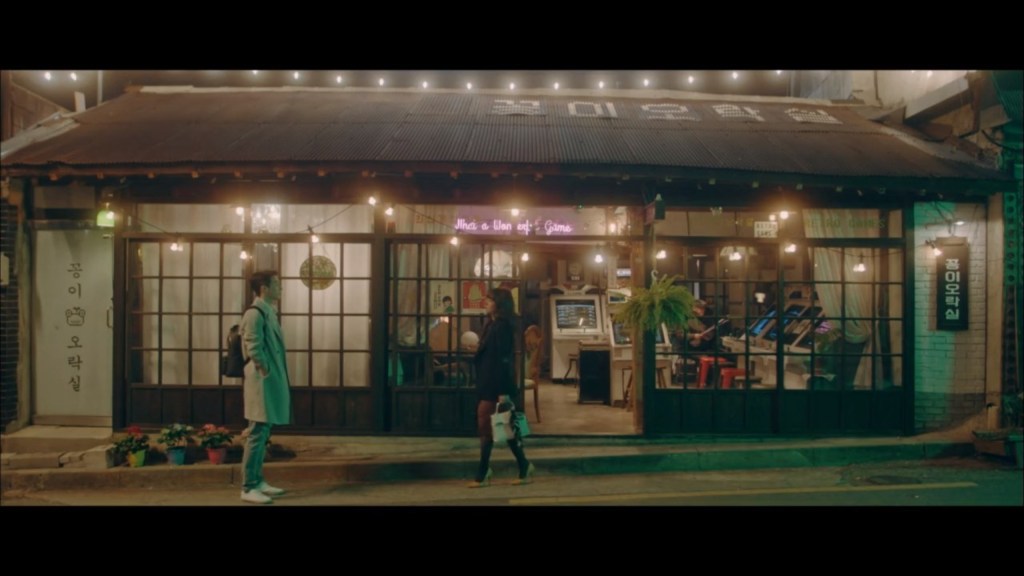
As my chosen follow-up to the romantic comedy The Beauty Inside, Search: WWW was a slow burn. It isn’t animated by the same bouncing giddiness, the same colors. Where Beauty hooked me right away, I spent the first few episodes of Search: WWW lost. Partly, it’s the story, which concerns a kind of consumer technology outside my experience: the web portal. Not a search engine, but an all-purpose website built around the search engine, with social media and MMORPGs. The inciting incident and recurring plot device is search keywords, a listing of the most popular searches, which reflects and affects the greater culture. Search: WWW opens with the allegation that the top web portal company, Unicon, has fabricated its search ranking to favor a presidential candidate. When protagonist Bae Ta-mi is offered up for sacrifice in the ensuing scandal, she jumps ship to direct competitor Barro and vows to overtake Unicon as number one.
In an early episode, it’s noted that these top web portal companies are a source of national pride. One of the popular real-world search engines, Naver, generated five billion dollars in 2019 (₩6 trillion); though unstated in the show, I imagine people are also proud of this. It’s easy to marvel at South Korea’s economic success story since its hard days of poverty and authoritarianism — especially since we have North Korea as a constant baseline of comparison — but becoming a global power invites discussion at the wielding. Much of Search: WWW proceeds via these necessary conversations, primarily the individual’s right to privacy and the relationship between government and chaebol, a Korean word with enough global usage it has a non-italicized entry in Merriam-Webster: “a family-controlled industrial conglomerate in South Korea.”
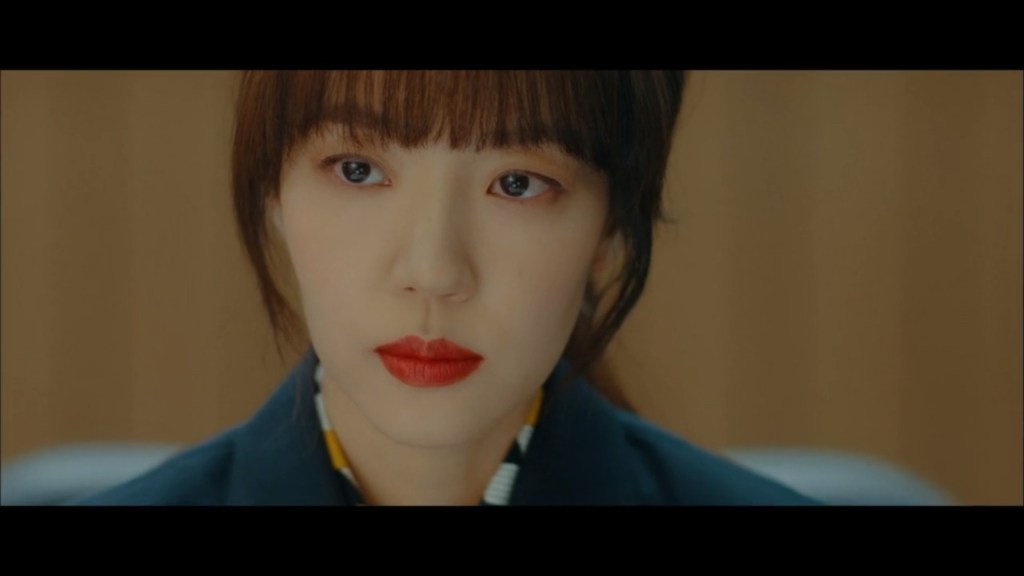
Im Soo-jung as Bae Ta-mi
Bae Ta-mi’s fall is orchestrated by her direct supervisor and friend Director Song Ga-kyeong — the show’s opening betrayal — but it was ordered by Unicon chairwoman Jang. From this schism we also split storylines: Bae Tae-mi at Barro, working with a woman she supplants as team leader, Cha Hyeon, or Scarlett, and Ga-kyeong’s continued mistreatment as a cog in the machine. Ga-kyeong is married to Oh Jin-woo, a filmmaker and Jang’s youngest son. This is a loveless, political marriage that saved Ga-kyeong’s family from bankruptcy, and it leaves her taking orders from an abusive mother-in-law, who is in turn obsequious with government officials. This recalls the activities leading up to President Park Guen-hye’s removal from office and subsequent criminal conviction. As a cheat sheet from the BBC News site will tell you, “the court ruled that she had colluded with her close friend, Choi Soon-sil, to pressure conglomerates such as electronics giant Samsung and retail chain Lotte to give millions of dollars to foundations run by Choi.” Also caught up in this scheme were the Lotte Group chairman and the vice president of Samsung.
Search: WWW is the debut of head writer Kwon Do-eun, who worked — in the room, I suppose — with a modern K-drama legend, Kim Eun-sook (The Heirs, Descendants of the Sun), and while the freshman effort might show — in contrast to The Beauty Inside, for example — with vanishing characters and repetitive exposition, she demonstrates a mastery of the broad strokes and clearly has a lot on her mind. Search: WWW reflects essential truths about human nature in reaction to technology, capturing startling portraiture of the psychology required to reduce the world to virtual terms. And all of it’s interesting, but my telling veers closer and closer to “finding your self and your society in the face of a dystopic institution,” wouldn’t you say? So let’s take a hard pivot. As much as I’d prefer to contain the scope of this analysis to within the genre, at the very least Best of the Best is Korea-themed.
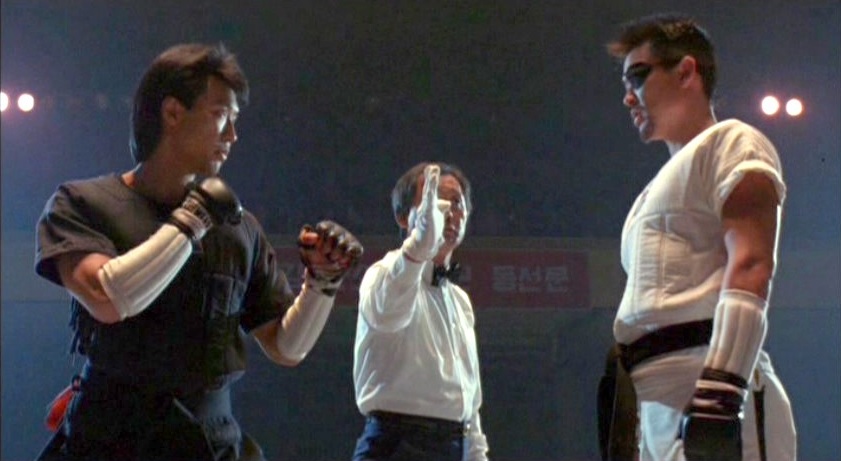
I recently viewed this taekwondo film for a podcast commentary, and that let me shape some thoughts about the purpose of story elements. In that film, let’s say the “A Plot” is an Olympic martial arts tournament, and preparation for the event is interrupted by a “B Plot,” the protagonist’s son being injured and hospitalized. Risking expulsion from the team, our hero returns home to be with his son. Then he comes back and after an argument with James Earl “No” Jones, everything is fine. Later, he competes in an Olympic martial arts tournament. While this sounds logical in a story-logic way, we’re missing the connection. His son being hospitalized doesn’t motivate his climactic action in the A Plot. Even if it did, what, thematically or character-wise, does his son being hospitalized have to do with a martial arts tournament? In the screenwriter’s dutiful manufacture of drama, they’re looking away from the A Plot, the film’s very premise and subject matter. I’d hope one can find drama in terms closer to the tournament, like the catharsis of victory or a battle with self-doubt, as otherwise such things become arbitrary.
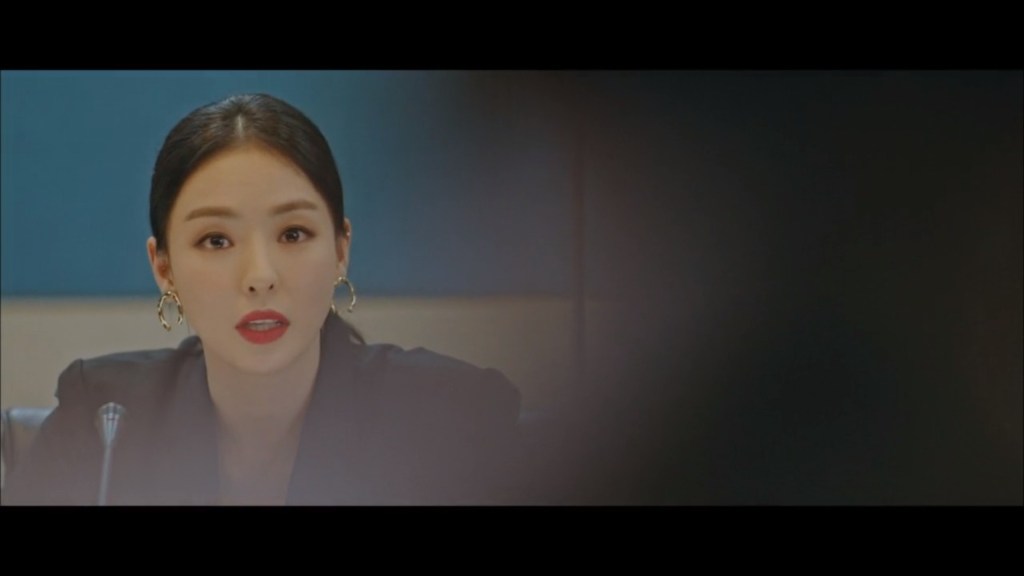
Barro employees take English names, so Bae Ta-mi becomes “Tammy,” and Cha Hyeon is “Scarlett“
As discussed in the writeup on The Beauty Inside, any separation of “A Plot” and “B Plot” is far more pronounced in K-dramas. In the case of Search: WWW, we’ll call the chaebol/government aspect the A Plot, since it’s where the title derives, and we’ll call the romance the B Plot. The problem again is that A and B don’t connect, and like the theoretical dramatic martial arts tournament in Best of the Best, the B Plot is where the show is at its most emotionally stimulating. What do any of the interesting questions raised about technology and political corruption have to do with romance, and do we think about them when our hearts are fluttering? And so I think, if these points must connect, it’s that the experience of these characters navigating the A Plot powers their engagement in the B Plot. So let’s break that down, starting with Cha Hyeon.
Why Cha Hyeon and not Bae Ta-mi? For this part of the discussion, Cha Hyeon is, in my view, the more successful character (and one of my favorite characters in anything, ever). This split between A and B has assigned each plot a distinct role, which overlooks the thematic consequences of romance. I wasn’t entirely conscious of the show’s feminist aspects, nor was I willing to fully accept netizens’ claims in favor of them. “Even if it’s feminist, it’s Korean feminism,” or so I half-thought until I read this Tumblr essay, which describes the show’s world as one where the patriarchy simply doesn’t exist. I can see in the show that women occupy a number of top positions in either company, but I’d rationalized it as a necessity of the genre, much like how a lot of action heroes in commercial anime are women for reasons other than empowerment alone. If this is gonna be a show about women and a show about chaebol, it’s only natural some of the women will be executives, or that some will order around beefy dudes for nude paintings (perhaps I should’ve picked up on this).

(CW: Sexual Assault)
Cha Hyeon’s character introduction kicks off with a man groping her in the elevator, and while I was shocked by the level of violence she metes out in response — stomping him repeatedly, in heels — it rang ancient alarm bells about the pretense for “strong female characters.” And despite that I love the whole sequence, ending with Im Soo-jung’s wide-eyed terror, it even stands in contrast to later instances of, let’s say, girl power, those unheralded by sexual assault. She’ll slide over a car hood in pursuit of some jerk, smash a cheating boyfriend over the head with an iPad, and then menace him later in the hospital she’s visiting for the other guy she put there. Her character description on Wikipedia is perfect: “Her only goal is to become super rich so that she can pay for medical expenses after beating anyone or whomever she feels like.” “Only goal” might be inaccurate, but this interpretation is indicative. She treats the consequences to her beating people up as a price worth paying anyway — she’s already arrived, so to speak. The world feels easy for her because she genuinely seems to enjoy it.
The actress Lee Da-hee is a revelation. She started her career as a model, and indeed she’s very beautiful. Her song on the soundtrack, “When I See You on TV,” is a gorgeous showcase for her butter-smooth voice. I also seem to recall her dancing on an episode of Knowing Brothers — triple threat! And like with The Beauty Inside, Search: WWW, demonstrates she’s also a killer actress. Da-hee is careful to tune Cha Hyeon’s demeanor to each new setting while never straying from her essence. She’s the maknae to both Ga-kyeong and Bae Ta-mi, so despite that she’s an adult and physically imposing, she takes on a softer voice with Ga-kyeong, barely making eye contact. She’s tough with Bae Ta-mi, but deep down, there’s a desire to impress or be taken care of, revealed only at her drunkest. Cha Hyeon sits up in Bae Ta-mi’s bed and coos “Unnie” before rushing off to throw up in the sink. Aside from the occasional hangover the next morning, her coworkers would never imagine — wouldn’t dare — such an image of the fearsome Scarlett, nor the one where, upon learning her favorite K-drama isn’t airing that morning, she flops on the couch and whines, kicking her legs all about.

The K-drama is called What’s Wrong With My Mother-in-Law?, and it’s accurate to the form but heightened to the point of acute parody, the unlikely entree to Cha Hyeon’s romance story. The lead actor, Seol Ji-hwan, inspires in her the strongest emotions, namely anger, and she later encounters him in real life. Believing he’s running from the police, she subdues him and beats him on the head like punctuation to her ranting. Quickly cleared of criminal suspicion, he proves all the more intriguing to her, saying idiosyncratic, vaguely philosophical things. Their burgeoning relationship reveals Cha Hyeon’s final layer, something more childlike than professional Scarlett, as if she’s letting herself live out this fantasy of dating a K-drama star. And Ji-hwan makes a perfect match, as well as a refreshing change of pace, because he’s just very nice. He doesn’t play games, he isn’t even sarcastic. Upon their first meeting, wherein Scarlett’s kneeling on top of him, he simply starts with, “It’s not that, please let go.” In fact, Ji-hwan is so quiet that his actor Lee Jae-wook has to do a lot with his face, communicating the thoughts inside his head without voiceover.
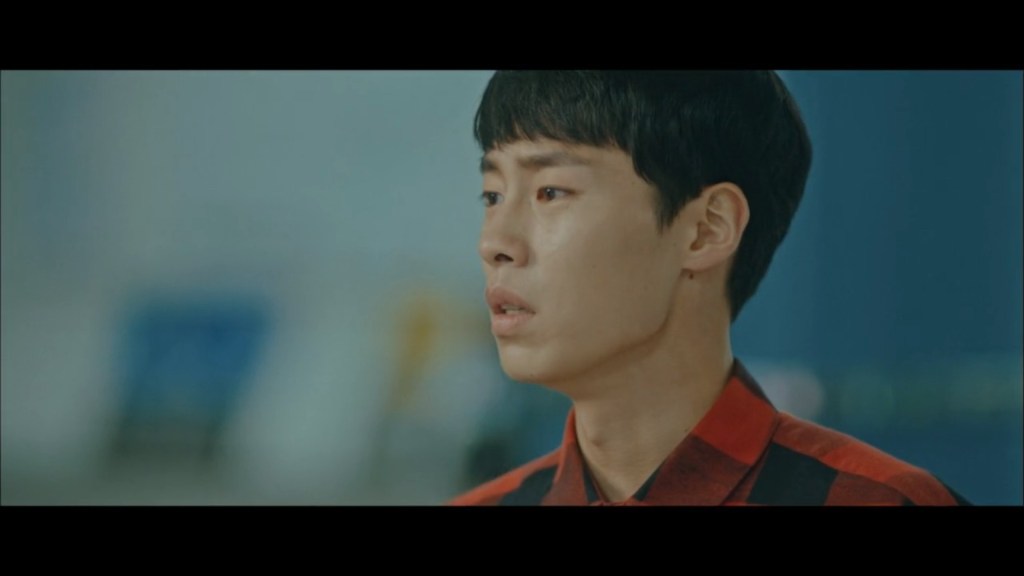
So we have an understated, softhearted young man and Cha Hyeon, who is ironically the show’s most moral character — it’s just that she expresses her morality with strict, violent justice. “If you’re going to run away, you should have run carefully,” she scolds him. You might suspect that two pure hearts don’t make for much conflict, and you’d be right. This isn’t about Cha Hyeon’s growth as a character. She learns nothing about herself that she just had to learn. Instead, it’s fun, because her attraction to Ji-hwan brings out her most joyous side, putting her in touch with a childhood innocence she’s lost but doesn’t mourn. It’s like optional happiness, as otherwise she’s fulfilled by her professional life, so much so she doesn’t resent Ga-kyeong for a dream-ending injury. If the relationship doesn’t work out, she won’t be broken and lonely, but she will be sad, and that’s a perfect example of stakes.
What powers the drama of this romance isn’t the fail-state of “breaking up,” but the absence of the romance, and Cha Hyeon’s sadness. It’s in the directors’ control of cinematic language and Da-hee’s acting that the difficult but important beats are hit, like those moments where Scarlett develops feelings beyond her fandom. She’s on set, he walks off a scene to talk with her, and there’s slow-motion and her eyes, but no dialogue or voiceover. This is what’s at stake when the couple, who suffer zero disagreements, are threatened only by external factors. First, it’s definitions, as Scarlett has to address the fantasy and decide if a fan and celebrity might ever make a legitimate relationship. Second, it’s Ji-hwan’s mandatory military service. All the while, Cha Hyeon is adorably defending Ji-hwan against a rival actor on set or throwing her weight around with the director to regain “her actor” his job. And then there’s that unforgettable kiss, haloed by the flashing phones in the lost-and-found closet. All of this dimensionality feels part of a whole, stemming from a sort of investment, an intrigue with the world. She’s interested in things, and sometimes, they get to her.

The character Cha Hyeon brings the actress closer to our understanding of Lee Da-hee as witnessed on Running Man and Knowing Brothers. In an interview with Grazia, Da-hee concurs, saying that “Cha Hyeon and I are almost 100 percent in sync.” And yet, there’s a part of me that wonders about the thought process behind Da-hee’s casting. Surely Cha Hyeon was written beforehand, but who looked at the character and thought, “Lee Da-hee”? If they did, the thought process was, “Oh, she’s tall, she must be violent,” which is the inverse of the classical, “Oh, she’s small, she must be submissive.” Can’t one simply exist without the other? Yes, and it does, in Search: WWW. I think the difference has always been quality, and Cha Hyeon is more than her physical domination. We see her working out, meditating, sparring, and of course, watching K-dramas. She has a life outside of work, we come to understand her drinking habits, her dreams, her hangups — bad behavior — and her professional conduct in the office.

And then we have Bae Ta-mi, our lead. This is where the spectrum begins opening up, as she’s a career-minded woman whose circumstances don’t grant her the breadth of life that Cha Hyeon enjoys. Where Cha Hyeon’s already arrived, Bae Ta-mi struggles in her position to achieve a long-shot goal. Because her professional devotion isn’t poisonous to her loved ones or eating away at her, I want to then say her journey is cathartic revenge or something, but Bae Ta-mi is quite passive. When she takes action, it’s likely spurred into being by a sudden twist of fate, like her name showing up on the rankings. It leaves the actress Im Soo-jung opportunity to exercise a particular skill, expressing “world crumbling” with her very posture. Her shoulders curl in and her eyes go wide — we can practically read the frantic thoughts behind them. What ultimately fascinates me about Bae Ta-mi, especially in terms of empowerment, isn’t anything broad strokes, but the moment-to-moment depiction of her leadership. Upon moving to Barro, she recognizes that Cha Hyeon’s immediate antagonism mirrors her own relationship with Ga-kyeong, and she therefore values Cha Hyeon as she wishes she’d been valued. It’s a miniature team of rivals that plays out time and again, and all along, we understand how significant these heated discussions are.

Bae Ta-mi’s B Plot is that of the whole show’s, her romance with musician Park Morgan. As a note, both of these romances so far are “noona romances,” wherein the woman is older, and the age gap is considerable in each case. I look back at Something in the Rain and simply can’t believe it, because Bae Ta-mi is ten years older than Park Morgan. It disturbs her to learn that Girls’ Generation debuted when he was in high school. And then Cha Hyeon and Ji-hwan’s gap is a stunning 13 years, judging by their respective actors’ ages. It’s possible the in-show gap is smaller, since one of the supporting actors Song Ji-ho (Alex) is playing about five years older. This could be part of the empowerment through-line as well, though in the case of Bae Ta-mi and Park Morgan, I’m not sure it alters the usual power dynamic. I want to like Park Morgan, but he’s a little too mysterious, a little too haughty, like he’s “untouchable,” but this isn’t a gangster story or anything. Always speaking in riddles, always teasing Bae Ta-mi, he’s very popular with girls, and lesser men are instinctively suspicious of him. The author of that Tumblr post cites the age gap as key to their conflict, that “it’s a difference in perspective that has its roots in the years of experience she has compared to him; it’s the difference in life perspective of a twenty something man, and an almost-40 [year old] woman.” Park Morgan wants to get married one day, and Bae Ta-mi doesn’t. This is a matter of the future that will irrevocably affect the present.

Something that struck me about The Beauty Inside was how, in a scene of characters sitting in the living room, when the doorbell rings or there’s a knock at the door, it’s always exciting. Like in television everywhere, scenes end with phone vibrations, so it’s important that each new interaction — especially when teased beforehand — tempers the mild disappointment of moving on. To this, Ga-kyeong’s characterization is the weakest of the three female leads. She has a smaller pool of interactions, and can’t express a range with people like Chairwoman Jang even if she wanted to. So much to say, her orbit does not pass the doorbell test. Whenever she picks up the phone, it’s reliably unpleasant. Her scenes have a flattening effect, only ever upping the stakes of her single conflict.
This repetition was near-fatal for me, as it was on Man in the Kitchen and with the laborious sexual harassment subplot of Something in the Rain — it’s the lack of dramatic momentum. The wisdom of Unicon’s antagonistic leadership is undermined at the point of Bae Ta-mi’s ouster, given she then strolls across the street and joins the competition. According to The Korean Law Blog, non-compete clauses do exist, as “non-compete restrictive covenants,” but perhaps their enforcement has an historically spotty record. I suppose a writer can start there and then make the leap to their effective erasure as part of the world-building, but it signals bad strategy on Chairwoman Jang’s part that later proves her predictable undoing. She pushes on Ga-kyeong the same way she had Bae Ta-mi, as if nothing went wrong the first time, and it leaves their conflict a spiral.

This is another case where the performer, Jeon Hye-jin, does a lot in moments without dialogue. It always appears she’s at her breaking point, but then she snaps back to focus with the most cutting possible comeback, usually directed at Bae Ta-mi. Part of the character’s design flaw, then, is that our sympathy for her is only generated in flashbacks, and her high school self bears no resemblance. Contrast is the point, but too much contrast breaks it. This is especially unfortunate, as the backstory is one of the show’s spicier elements. Ga-kyeong goes to slap Bae Ta-mi, but her wrist is intercepted in classic form by Cha Hyeon, who looks at her and says — wait for it — “Sunbae,” a term of respect for an older person. This was the first of many “Oh, shit” moments for me. We learn that these two knew each other in high school, and perhaps their feelings for one another were stronger than friendship. Cha Hyeon’s judo-ending injury came as a result of her protecting Ga-kyeong from bullies, and later we see young Cha Hyeon take Ga-kyeong by the hand to lead her away from a spat. We’re made to see how the simmering, compromised Ga-kyeong used to be a genuinely good person and object of adorable affection for Cha Hyeon, and this a good and tragic idea, but young Ga-kyeong expresses no attributes also shared by adult Ga-kyeong, and vice versa, I suppose.
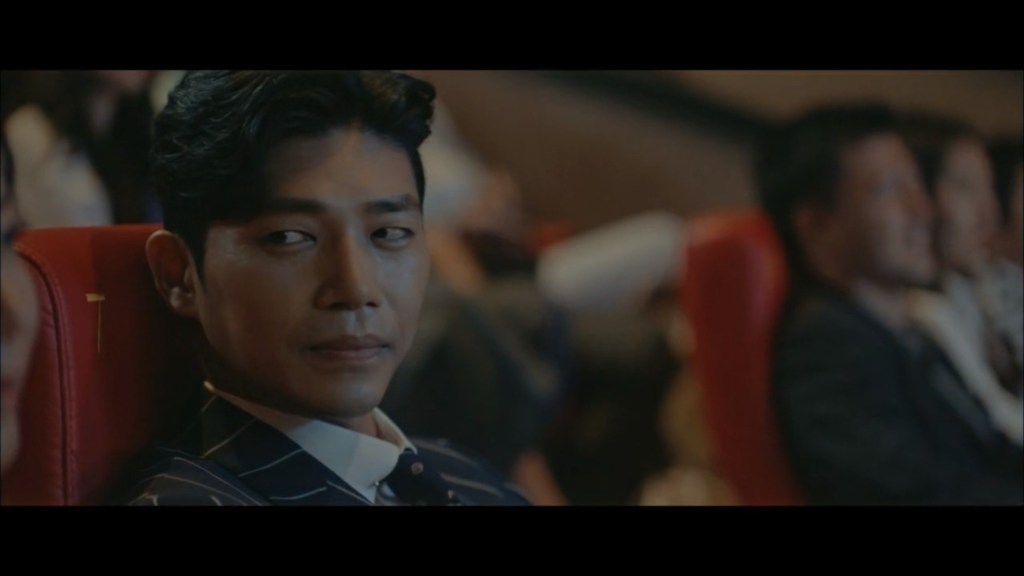
This may be the weakest element of the show — not just the Ga-kyeong disconnect, but a communication gap between what characters are clearly supposed to be and how we ultimately receive them. Ga-kyeong’s husband Jin-woo becomes increasingly sympathetic as the show goes on, and maybe it’s the actor Ji Seung-hyun’s uncanny resemblance to Tony Leung — in a role with the complicated masculinity of 2046 or In the Mood for Love — but in each sudden appearance he’s smiling through melancholic pain to deliver a new offer of self-sacrifice for Ga-kyeong’s benefit. Is this the same man who earlier tried to buy Bae Ta-mi’s silence with a tote bag of cash? Bae Ta-mi and Cha Hyeon smashed up his car, and my reaction was decidedly uncomplicated then. Until, of course, Ga-kyeong approaches and Cha Hyeon sees whose car she’s been obliterating. For Jin-woo, it’s like redemption with a missing reel somewhere, and this is repeated with Yoo Seo-jin’s character — Ga-kyeong’s direct superior — and then Kim Nam-hee’s character Pyo Joon-soo, Cha Hyeon’s adulterous boyfriend.
Joon-soo gets a decent turn in the end, gently breaking the news to Bae Ta-mi that Park Morgan’s birth mother died, though arguably he’d only done so as part of an errand. This is the guy who somehow dated both Bae Ta-mi and Cha Hyeon, and started dating Cha Hyeon while dating someone else. This is inconceivable to me. Why on Earth would anyone mess with Cha Hyeon like that, unless they don’t know how violent she is? Joon-soo is well aware, as when Bae Ta-mi confronts him with the infidelity, he begs her not to tell Cha Hyeon — “She’ll kill me,” he says, and means it. Of course, this sets up another of my favorite sequences: after Cha Hyeon learns the truth and wallops Joon-soo, he lets slip that Bae Ta-mi knew, so we smash cut to a trembling Bae Ta-mi before a slowly advancing and very pissed off Cha Hyeon. Bae Ta-mi struggles to come up with an excuse before Cha Hyeon starts chasing her into the next scene, wherein Bae Ta-mi is impossibly farther away. Cha Hyeon finally corners her in a library, and what makes this scene isn’t just Da-hee’s frosty anger, but Im Soo-jung’s instinctual understanding of how Bae Ta-mi would try to bargain her way out of the situation: poorly. Her attempts at reasoning are inexorably laced with condescension, and sure enough, Cha Hyeon restarts the chase.

Spoiler Alert!
As much as I love this sequence, there’s that part of me asking, “Was it earned?” especially if it’s the consequence of inexplicable judgment on Joon-soo’s part. At that point I realize it’s also extraordinary how Cha Hyeon and Ga-kyeong know each other, despite that the reveal totally rocked me. Does it make sense that these two old friends work at rival companies? Why wouldn’t Cha Hyeon move over to Unicon after one of those stressful crunch periods? Why wouldn’t Ga-kyeong have tried to scout her? I was sure to jot down my biggest “Oh, shit” moments, and now literally on paper, they look awfully silly. Things like “Scarlett and Ga-kyeong know each other” or “Jeong Da-in’s first love is Park Morgan” sound like non-events, while “Park Morgan’s mother dies in accident” is completely uncalled for. K-drama has this knack for making me care about anything, as Cheer Up! demonstrated with cheerleading and high school. But what if the trick is narrative contrivance?
The moment that got the biggest reaction out of me was “Jeong Da-in’s first love is Park Morgan,” which had me shouting “No! No! No!” at the screen. More seasoned K-drama fans, I’m sure, saw it coming a mile away. Jeong Da-in is a Korean expat living in Germany who chances upon Bae Ta-mi at a restaurant one night, and they strike up a friendship. To get closer to Park Morgan, Bae Ta-mi has the talented Da-in teach her the piano. As Bae Ta-mi and Park Morgan undergo their trials, Da-in begins mentioning how she’s hoping to meet her first love at the school reunion, and Bae Ta-mi soon learns that indeed, her first love is Park Morgan. “No!” But talk about coincidence. You’re telling me the one person Bae Ta-mi decided to buy a meal for that night is the girl who’s in love with her future boyfriend? It’s like the story is cheating, because it still got the reaction out of me.

If that was perhaps the biggest “oh, shit” moment, the biggest tearjerker moment was Park Morgan at his mother’s funeral. Again, our arrival here has been contrived. It just so happens that during this most eventful year in Park Morgan’s life, his birth mother dies in a car accident in Paris. As it’s gradually revealed, Park Morgan is adopted and was raised by loving parents in Australia. In the years since, he’s reconciled with his Korean birth mother, but the occasional reminder of their relationship still stings, like how he’s “Student Park Morgan” on her phone, not “Son,” which is reserved for someone else. For the sake of that other son and his father, Park Morgan has to keep all of this a secret. He can’t bring himself to even enter the funeral until Bae Ta-mi arrives and helps him. To push on this further, the birth mother promised to take Park Morgan to Paris next year, and also told him she’d bring back a present. The present turns out to be cards and letters from mother to son for all the years she wasn’t in his life — and you can just imagine me blubbering like a baby.

Maybe this storyline cuts a little too close to home for me as a Korean adoptee, but this will eventually be true for everyone watching K-dramas, that what’s on screen will reflect their life in some way. So I’m left marveling at the magic trick, and worrying that maybe a presentation of emotional turmoil is enough to sell narrative beats. Indeed, I am a sympathetic crier, but I want to believe there’s more here. Along with the direction and the acting, there’s an X factor at play, a desire born of inertia to interact only with what’s happening presently — Park Morgan’s tears — relying on nothing intellectually understood about him, only what I’ve been made to feel. I don’t think Park Morgan is the greatest, but I know what he means to Bae Ta-mi, and that makes him real enough for this moment to land. K-dramas perform these daring feats of gymnastics to maximize each moment; these shows exist entirely for the present, and this is how Bae Ta-mi ultimately chooses to live.
Search: WWW, like the best K-dramas, teases the funnest or most electrifying interactions between all the right characters, letting us stew in the possibility, and then executing. The center trio of Bae Ta-mi, Cha Hyeon, and Ga-kyeong hopefully rings as empowering, and while they didn’t necessarily in my case, their shifting dynamic was so entertaining. Ga-kyeong and Bae Ta-mi get into another spat, and Cha Hyeon arrives to intervene — their one link and mediator. What’s so great here is that Cha Hyeon is the only one who’s ever known Ga-kyeong’s other side, and she pushes on it, taking Bae Ta-mi by the hand and leading her away just as she’d done for Ga-kyeong decades earlier. I think the job of K-drama storytelling, whether it be flashbacks or exposition, is to ensure encounters are confrontations, that the audience buzzes with the multiple-choice potential of each confrontation, and in the end always choosing the correct answer.

Research / Further Reading
Actress Lee Dahee Revealed to have Worn Slippers at the ’34th Golden Disc Awards’ and the Reason will Make Your Stomach Hurt from Laughing
Enforcement of Covenants Not to Compete in Employment Agreements in Korea: Restrictive Covenants in Korea
in search of a better dream
Korean antitrust watchdog to step up scrutiny on chaebol family ownership
Lee Da Hee for GQ Korea
Lee Da Hee Talks About Similarities To Her “Search: WWW” Character + Why She Chose To Host “Queendom”
Netizens Went Wild After Learning Lee Da Hee Secretly Wore Slippers At The Golden Disc Awards
Park Geun-hye: South Korea court upholds 20-year jail term for ex-leader
South Korea’s Chaebol Challenge
I did more Da-hee research than ended up in this post, where it didn’t seem entirely relevant. But one of those articles speculates that she wore slippers at the awards show to look better standing next to the guy. And ho-ho-ho, what a laugh that is. Unacceptable!
I just read the first paragraph and felt sooo represented!! 🙂 Thanks for this text!
LikeLiked by 1 person
Thank you for reading!
LikeLike